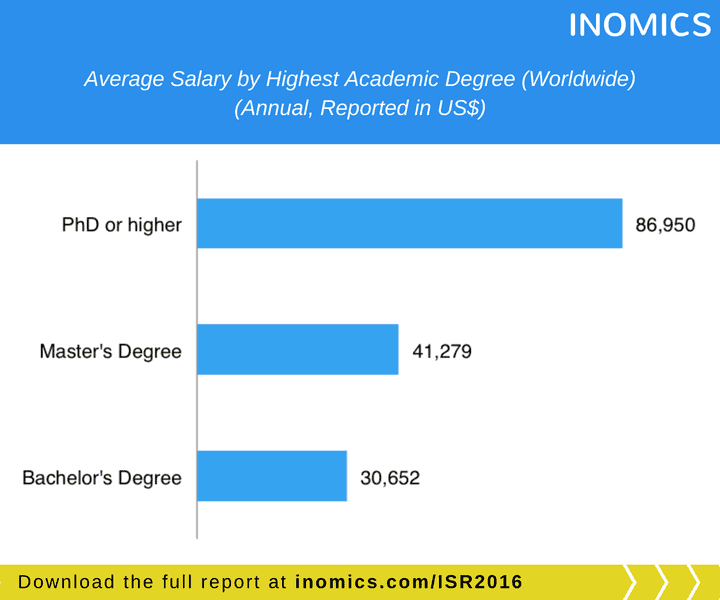The following article is archived and is no longer considered up-to-date. Please interpret its content in the context of the publishing date.

ARCHIVED
Will Obtaining a PhD in Economics Guarantee a Higher Salary in the Future?
Read a summary or generate practice questions using the INOMICS AI tool
With 2017 ASSA Annual Meeting in mind, we thought that this information will be helpful for all of you who are considering pursuing a PhD degree in Economics as many students and prospective PhD candidates often question whether obtaining a PhD in Economics is worth it. Will the time, effort and money spent on working towards a PhD guarantee you a higher salary when compared to the salary that can be earned with a Master’s or Bachelor’s degree?
The INOMICS Salary Report 2016 endeavored to determine, among other things, the answer to this question; as to whether furthering one’s education has a positive effect on the growth of one’s salary and how exactly the relationship functions between the highest level of education achieved and remuneration received.
The report found that the level of education achieved had a positive correlation to the average salary of the respondents. It was found that as one climbs the academic qualification ladder, their salary increases. In fact, holders of a Master’s degree earned 35% more than those who held a Bachelor’s degree alone. Further, those who had obtained a PhD earned 111% more than those whose highest degree was a Master’s.
The resultant conclusion is that obtaining a PhD is financially beneficial to the holder in the long run.
Information in the graph is based on the INOMICS Salary Report 2016. The report reflects job market and salary trends for economists, ranging from those just starting their Master’s to those working as senior professors or researchers in academia and the private sector.
Key findings include:
✓ Professors consider research publications more relevant for their employability than teaching skills.
✓ The gender pay-gap for economics professors at North American universities seems to have narrowed to the point of non-existence. If anything, female academics seem to earn slightly more than their male counterparts.
✓ Salary is not a primary motivator, although it has a demotivating effect if too low.
✓ A higher salary is considered as more important in some regions, for example in Asia, especially among people working outside of academia.
-
- PhD Program
- Posted 1 week ago
9 PhD Positions in the Research Training Group 2865 “CUDE”
Starts 1 Oct at University of Bielefeld in Bielefeld, Germany
-
- PhD Candidate Job
- Posted 1 week ago
Environmental economics, applied econometrics, behavioral / experimental economics, information economics
At University of Neuchâtel in Neuchâtel, Switzerland
-
- Conference
- Posted 1 week ago
CESifo Venice Summer Institute 2025
Between 23 Jun and 26 Jun in Venice, Italy











